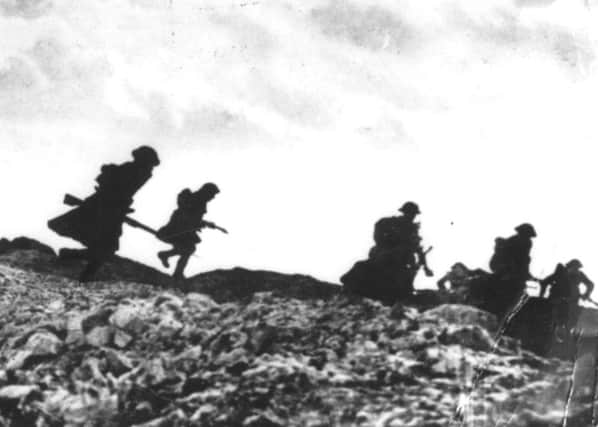Scotsman 200: '˜On they went in most amazing fashion' at the Somme


MONDAY 4 SEPTEMBER 1916
The Royal Scots’ splendid part in the Great Advance
So gigantic is the scale of the war, and so rapidly moving are its chances and changes, that events are fated to become old very soon. To say that they become old is not to imply that they are forgotten. Many of them are stamped indelibly on the nation’s memory and on the pages of the world’s history, but so prolific of stirring action and gallant episode is the war that comparatively recent events already seem far away. But the opening of the great British and French offensive on the Somme red-lettered the First of July among even the greatest days, and information which has just come to hand indicates the splendid manner in which the Royal Scots bore themselves on that occasion. The glory that was by the regiment on that fateful morning will be shared too by the community of Manchester, for many of the sons of that city were also prominent in the assault. Where the standard is so high as it is in the British Army, outstanding reputations are far from easily earned, but the fame of the regiment has spread along the front, and it is known as among the foremost of Kitchener’s Army.
Like many others they had, of course, spent dour and trying times in the trenches, and so far as the ordinary run of things goes “out there” they had been through it. But they had never been “over the bags”, which is Tommy’s descriptive phrase for mounting the trench and going into action. How they cocked their ears when the word at long last came that they were to go forward! The prospect of “going over the top” had opened up to them at last.
Advertisement
Hide AdThe morning of the 1st July was a glorious one in a weather sense too, and the drama of the battlefield was enacted in the limelight of resplendent sunshine. While the men of the Royal Scots waited to mount the parapet they were a jovial company. They sang and they laughed. They had the honour of going out first. Here, truly, was an incentive. The men felt they had a great duty imposed upon them, and they rose nobly to the occasion. Led by their pipers and their most inspiring music, the men set across the open for the enemy trenches. The distance to be traversed, I am told, was roughly about 700 yards. So the men started steadily to march. “They were as cool as could possibly be,” said one of them who is now a convalescent at home. “You would have thought we were going to a picnic – the sun was shining and the lads were so cheery.” But the ground was somewhat difficult underfoot, and comrades began to fall here and there as the enemy bullets pierced the lines. The men never wavered. On they went in most amazing fashion considering that the deadly experience was new to them. Each of them was resolved to die gamely.
On they trampled across that stretch of ground, which was pitted with shell holes and broken by the engines of war. When they neared the German lines they doubled their determination, if that were possible, and went for the enemy tooth and nail. Our bombardment had reaped a plentiful harvest. The enemy barbed wire was pulverised, and after passing over it the Royal Scots went steadily through to the fourth line of German trenches. There were many enemy dead in the area. Others who lived through the bombardment appealed for “Mercy, Camerade.” But there was plenty of fight in some of them. The resolve and steadiness of the Royal Scots was irresistible. Here is what an officer, writing proudly from France, says of the day’s achievement:
“Everyone did wonderfully well, none better. The men were just splendid, and the regiment won undying fame.”
Another letter from the front is equally enthusiastic about the valour and success of the regiment in the offensive. “The men covered themselves with immortal glory,” it stated, “and their achievements rival anything in the history of the British Army.”
Today, through the lines there is a strong note of pride. But it is not boastful, and it is never personal. It is the pardonable pride of regiment.
The full text of this edited extract can be found at The Scotsman Digital Archive